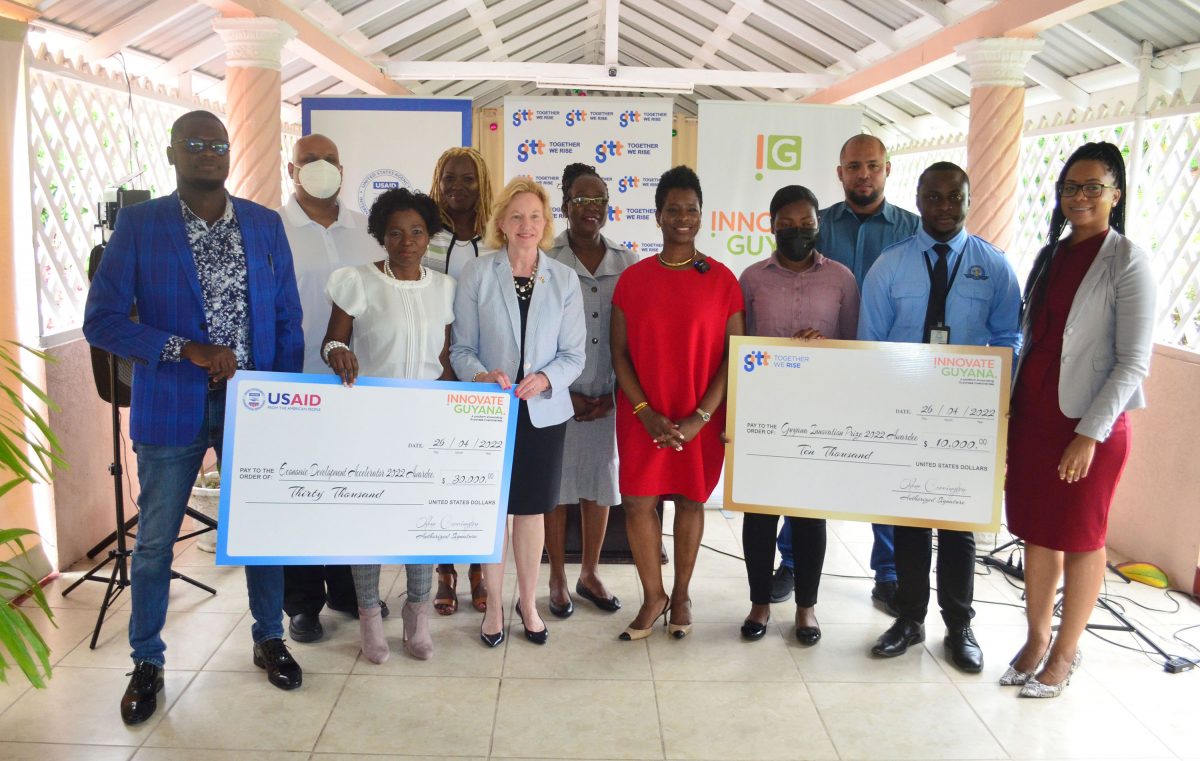Eight persons were yesterday awarded cash grants through the Guyana Economic Development Trust (GEDT) to support their unique innovations and businesses.
At a ceremony held at Bookland Gardens, in Georgetown, Jubilante Cutting, Vickacy Williams and Lisa Dublin each received a 10,000 USD cash grant as winners of the Guyana Innovative Prize, which is sponsored by the Guyana Telephone and Telegraph Company (GTT) and GEDT.
In addition, Tasmin Pellew, Grace Parris, Osrick Hacker, Dianna Plowell and Dwayne Wade each received cash grants worth 30,000 USD through the Economic Development Incubator and Accelerator (EDIA) programme, which is a collaboration between GEDT and the US Agency for International Development (USAID).
The GEDT has said the Guyana Innovation Prize provides pre-seed funding to commercially viable and scalable ideas in tech and agro-processing emanating from the work of University of Guyana students, faculty, and alumni. The Prize is awarded on a competitive basis, and requires participation in the Trust’s mentoring programme to help University of Guyana founders to succeed in their efforts to commercialize research and ideas.
The EDIA, which was announced last year, is intended to provide agro-processors with training and hands-on technical assistance as well as financial support for their growth.
According to the GEDT Chief Executive Officer Oslene Carrington, although the organisation receives many applications annually, the numbers are eventually narrowed down to five awardees per programme.
“…Our criteria vary. For the Economic Development Accelerator, you obviously have to be in business…so you have to be in business for a couple of years and generating income. You have to have a product that is fully finished and other governmental obligations.”
Persons who are interested in applying must have a stable business in operation for over a year and all governmental obligations must be fixed.
“…On the Innovation Prize we have an expectation that you own your innovation—you cannot be bringing something that’s owned by somebody else and also you have to have something that again is oriented towards Science and Technology and that actually works…,” said Carrington.
The CEO encouraged persons to apply since applications for 2023 are currently open.
Speaking on behalf of the USAID was US Ambassador to Guyana Sarah-Ann Lynch, who told the graduates that their success is critical for the overall success of Guyana’s economy, while also noting that her country’s support will always be accessed, especially in areas of Science and Technology.
Dublin, of EcoCarb GY, explained to Stabroek News that her product deals with activated carbon made from coconut waste to clean drinking water. “It’s an absorptive system so it’s a filter that absorbs any kind of pollutants, whether organic or inorganic on the substrate, so at the end product it has less colour, it has less pollutants and less suspended solids as well,” Dublin explained.
Williams, of Aurora Technologies, said that his business deals with decorative construction tiles which are made from waste plastics. “For the past couple of years my primary objective has been sustainability and environmental conservation, so I found a way to turn waste plastics into construction materials. For example, tiles that can help in a great way to help clean up the environment of waste plastics,” he noted.
Hacker’s company, Blue Ribbon Manufacturing, deals with extracting a special type of vanilla, which is used to flavour different types of cuisines.
“We started in 2018 with vanilla extract because we wanted to make a product that would put Guyana on the map internationally. Vanilla extract is the second most expensive spice in the world and we decided to do that because we have expertise. So, we’re now gearing up to export overseas. This programme has been very helpful in getting our checklist done and making sure that we meet other requirements,” he explained.






